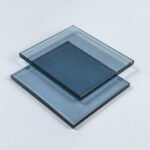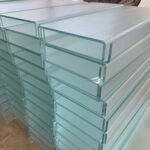What is Smart Glass?
Smart glass, also known as intelligent glass, dynamic glass, or switchable glass, represents a groundbreaking advancement in architectural and design technology. This innovative material empowers users to manipulate the transparency and light transmission of glass surfaces, making it an essential component for contemporary buildings and products.
Types and Technology of Smart Glass
- Electrochromic Glass: A widely used form of smart glass, electrochromic glass alters its opacity when an electric current is applied. Users can toggle between clear and tinted states, facilitating effective management of sunlight and glare.
- PDLC (Polymer Dispersed Liquid Crystal): This liquid crystal glass becomes opaque upon the application of an electric field, providing instant privacy. It reverts to transparency once the electric field is removed.
- Self-Tinting Glass: Also referred to as photochromic glass, this type automatically darkens in response to sunlight, promoting energy savings and comfort by reducing heat buildup indoors.
- Thermochromic Glass: Similar to self-tinting glass, thermochromic glass reacts to temperature changes, modifying its tint based on heat levels.
- Smart Film: A versatile alternative to traditional smart glass, smart film can be applied to existing windows to deliver similar functionalities without requiring full replacement.
- Privacy Glass: This term encompasses various types of switchable glass designed specifically for maintaining confidentiality in environments like offices and medical facilities.
- Light-Responsive Glass: This glass adjusts its properties based on light intensity, contributing to energy efficiency and user comfort.
- Adaptive Glass: Often used interchangeably with responsive glass, adaptive glass refers to materials that modify their characteristics in reaction to environmental conditions.
- Digital Glass: This type combines displays and sensors, allowing it to function as an interactive medium that seamlessly transitions between display and transparency.
- High-Tech Glass: This broad term captures the essence of all smart glass technologies, emphasizing their modern applications and advantages.
Applications of Smart Glass
Smart glass finds diverse applications across various industries:
- Architecture and Construction: Energy-efficient glass is increasingly employed in architecture to create buildings that optimize natural light while minimizing energy consumption. Architects design structures that lessen reliance on heating, ventilation, and air conditioning (HVAC) systems.
- Automotive Industry: In vehicles, smart windows enhance passenger comfort by providing real-time control over sunlight and heat. Features like electrochromic sunroofs switch from clear to tinted, enhancing the overall driving experience.
- Consumer Electronics: Interactive glass is becoming common in devices like smart mirrors and touch-sensitive displays. These innovations not only offer functionality but also elevate aesthetic appeal.
- Healthcare: Hospitals are integrating high-tech glass solutions to improve patient environments. For example, privacy glass ensures necessary confidentiality for patient rooms while allowing natural light, creating a calming atmosphere.
Benefits of Smart Glass
The advantages of smart glass are extensive:
- Energy Efficiency: Smart glass leads to substantial energy savings by reducing the need for artificial lighting and cooling.
- Enhanced Privacy: The ability to switch between transparent and opaque states allows users to easily control the privacy of their spaces.
- Aesthetic Appeal: The sleek, modern look of intelligent glass makes it suitable for various architectural styles, enhancing the visual impact of any environment.
- Safety and Security: Certain nano-coated glass types are designed to be shatter-resistant, offering added security for both residential and commercial settings.
In summary, whether called solar control glass, smart glazing, or responsive glass, the evolution of smart glass technology continues to transform our environments. Its versatility and innovative features make it a vital component in crafting sustainable, efficient, and aesthetically pleasing spaces.
To learn more about our products, please visit https://trustmyglass.com/products












































